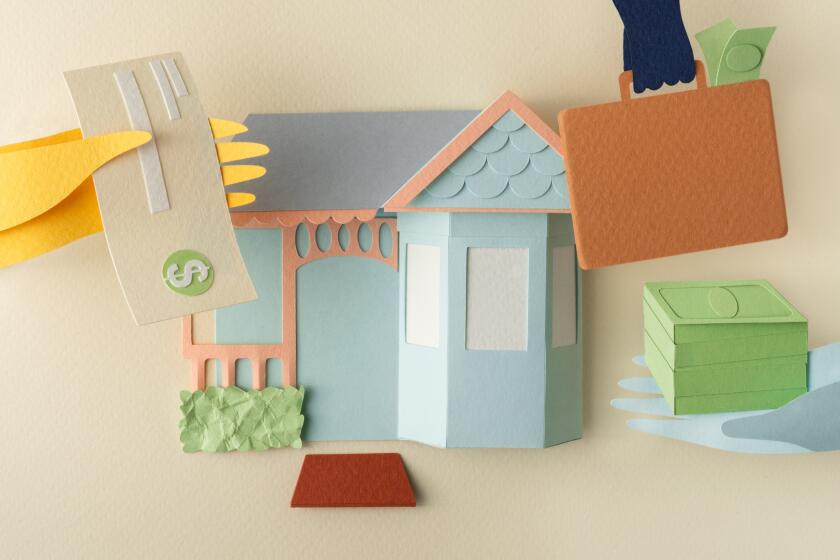
- Share via
If you’re like the vast majority of Southern Californians, you’ll have to take out a mortgage to buy a home. It will almost certainly be the largest sum you’ve ever borrowed, an order of magnitude more than your last car loan or your most extravagant credit card purchase.
Mortgages aren’t just bigger loans. They also involve more complicated choices than other forms of credit, forcing you to make bets on what the economy and your finances will look like years into the future.
Use this calculator to get an idea of how much you can borrow, and explore which ZIP codes have a typical home price that will fit your budget.
If you’ve never gotten a mortgage before, you may not even know where to start.
How do you find a good lender? How do you judge which loan has the best terms? And how do you decipher the arcane language spoken by bankers and mortgage brokers, filled with acronyms and jargon?
Let’s start with the basics.
Loan Costs
Lenders and the investors who purchase their mortgages take on the risk that you won’t pay back what you owe. They also incur costs in determining whether you are worth that risk. For those reasons, you’ll probably spend a lot more paying off the loan than you borrowed.
To understand how that works, let’s talk about a few terms.
- Principal: This is the amount you borrowed to buy the house. You will pay all this money back, plus more in the form of interest.
Interest rate: This determines how much the loan will cost you in addition to the principal amount. For the first several years, most of what you’ll pay every month will be interest charges, not principal. The rate you pay depends on market conditions as well as your own personal situation. Lenders tend to charge a higher rate if you have worse credit or put less down.
During the pandemic, many people locked in rates below 3%, but borrowing costs have been rising. To see the latest average mortgage rates, visit Freddie Mac’s website. The averages are based on people with excellent credit who put 20% down, so your rate may be higher.
- Points: This typically refers to an upfront fee you pay to reduce your interest rate and potentially lower the total cost of your mortgage. Each point equals 1% of your original principal. Some lenders also use the word points to refer to fees that are not tied to the interest rate, according to the Consumer Financial Protection Bureau.
Closing Costs: This is a catch-all term for the total amount you will pay to close the deal for your house. These costs do not include your down payment, but do include things such as points and fees for the services provided, including originating the loan, appraising the property and searching for other claims on the title, along with required prepayments of taxes and homeowner’s insurance.
Your lender will give you an estimate of closing costs well before closing. The average in California is 1.02% of your home price, according to a report from Forbes Advisor.
Mortgage options
There are many different flavors of mortgages, but they fall into two main categories: fixed rate and adjustable rate. Like the names suggest, fixed-rate mortgages are loans with an interest rate that stays the same for the entire life of the loan. With adjustable-rate mortgages, the interest rate changes over time.
To buy a home, most people opt for a 30-year fixed mortgage, the longest mortgage typically available. The longer payback period increases the amount of interest you’ll pay over the life of the loan, but it shrinks your monthly payment.
One of the big benefits of this mortgage is security. If you are a renter in Southern California, there’s a decent shot you’ve stomached some pretty hefty rent increases over the years. But with this loan your principal and interest — the largest part of your mortgage payment — will stay the same for 30 years.
Most people don’t buy a home with a 20% down payment. Here’s how you can put down less and get more help with down payment and closing costs.
You can also find 10- and 15-year fixed-rate mortgages, which typically carry lower interest rates. But because the payback period is so short, the monthly payments are considerably higher. These products are primarily used by people who have paid much of the principal on their original 30-year loan and want to refinance.
Adjustable-rate mortgages also come in different shapes and sizes, but what they all have in common is that your initial rate will change. That initial rate tends to be lower than a fixed-rate mortgage, but it will adjust to a predetermined percentage above a benchmark bank interest rate after a certain number of years. If interest rates go up (as they do during periods of inflation), your rate will go up. If they go down (as they do during recessions), your rate will go down.
The safest adjustable-rate mortgage is a “fully amortizing” one, which is just like a standard fixed-rate mortgage in the sense that it’s designed to pay principal and interest every month. But there’s also a riskier “interest-only” option, in which you’ll pay just the interest on your loan for the initial period. This option offers low monthly payments at first, but when the initial period ends, those payments can skyrocket.
A common adjustable-rate loan is known as the 5/1 ARM. With this type of loan, your initial rate will last for five years, then adjust annually until the loan is paid off. Another popular option is the 10/1 ARM.
The Great SoCal House Hunt
“You may want to consider this option if, for example, you plan to move again within the initial fixed period of an ARM,” the Consumer Financial Protection Bureau says on its website. “However, if you end up staying in your house longer than expected, you may end up paying a lot more.”
Andrew Pizor, staff attorney at the National Consumer Law Center, said the predictability fixed-rate mortgages provide is why he recommends them over ARMs, especially today, when despite recent increases, rates are still comparatively low.
“Lock in a low fixed rate,” he said. “When you get an ARM, you are gambling on the direction rates are going to go, and rates are more likely to go up than down.”
More key mortgage terms
When you shop for your mortgage, you may take out one that’s issued or insured by the U.S. government through a federal agency. Or you may get a mortgage that’s later sold to Fannie Mae and Freddie Mac, government-controlled mortgage companies best known for nearly capsizing during the subprime mortgage meltdown. Or you may wind up with a mortgage that a lender holds on its books or sells to private investors.
All these types of loans have somewhat different requirements and costs, so it’s good to know the difference.
Talking to lenders
You’ll need to line up a lender before you start making offers on homes. That’s because you’ll need a lender’s support to persuade sellers that you can be counted on to close the deal.
The prize you’re seeking at this point isn’t a loan, but a letter from a lender that says how much you’re prequalified or preapproved to borrow. Obtaining one will require you to provide information to the lender about your income and assets so it can decide whether you can afford a loan big enough to buy the property in question.
“A seller wants to go into a contract in good faith with a buyer who has the clear ability to close on a property,” said Heather Ozur, a Palm Springs real estate agent and treasurer of the California Assn. of Realtors.
A stronger offer is one with a preapproval letter, Ozur said, because preapproval typically requires buyers to jump through many more hoops than prequalification in order to show they’re ready to go. Specifically, you’ll have to provide documents to support your claims about your income and assets.
If you want your offer to stand out even more, agents say, you could even get something called a fully underwritten preapproval, which requires even more vetting of your financial health.
“That is now the best thing to submit,” said Valencia real estate agent Amber Dolle.
The Consumer Financial Protection Bureau, however, says the distinction between prequalification and preapproval isn’t always clear, and it recommends checking with a real estate agent to ensure your letter accomplishes what it’s supposed to: assure a seller you will get the loan to purchase their house.
Southern California home buyers talk about how they made it through — or around — the flurry of ever-higher bids.
You’ll want to get quotes from multiple lenders — at least three, experts say — to compare loan pricing and get the best deal. To find potential lenders and start this process, you can look up online reviews and ask family, friends and real estate agents for recommendations of lenders they trust.
When picking, you will have various options. You can choose one of the big national banks, such as Chase or Bank of America, or you can choose from large nonbank lenders such as Rocket Mortgage or LoanDepot. There are also smaller banks and mortgage companies to choose from, as well as credit unions.
A mortgage broker, who has relationships with multiple lenders, is also an option. A broker shops around for the best deal for you and is paid either by the lender you eventually choose or sometimes by you directly.
When shopping around, experts say to let the people you speak with know you are talking with multiple companies for the best deal, but to also be aware of issues beyond pricing.
Some real estate agents recommend choosing a small local mortgage company or a loan officer with a national firm who lives in and specializes in the area where you are buying. The idea is that locals are more responsive and can finalize loans more quickly than someone sitting at a desk halfway across the country. In today’s market, promising a fast close can also help your offer stand out among others, so ask how quickly a lender can close.
Pizor said he is generally agnostic on size or location of lender, but borrowers should review a national database, known as the NMLS, to check if a lender is unlicensed or has drawn serious complaints.
Also make sure you feel comfortable with whomever you choose.
“Especially first-time buyers, you need someone who is going to take your texts, emails and nervous questions and nervous moments and hand-hold them,” said Jan Emamian, a Compass real estate agent in Pasadena.
When it comes to trying to get the best price, there are some things you should know.
Lenders typically do a “hard pull” of your credit when you request a preapproval, and this can cause your credit score to dip, at least temporarily.
Uncommon ways to buy a home
So if you’re planning to seek preapprovals from a bunch of lenders, you’ll want to contact them in relatively quick succession because multiple checks within a 14- to 45-day period count as just one, depending on the credit scoring model lenders use.
Some experts recommend shopping around without starting that clock, either by telling the lender your credit score or by asking the lender to do something called a “soft pull” that won’t affect your score. The numbers you get this way will probably be less accurate than the ones that come from a preapproval, however.
And lenders aren’t bound by the cost projections they put in an informal quote or a preapproval letter, Pizor said. That’s why it’s best to get an official “loan estimate” from the lenders you are considering that details all the costs associated with the loan, he said.
Once they’ve given you a loan estimate, the Consumer Financial Protection Bureau says, lenders can make changes only if “new or different information is discovered in the process,” such as the appraisal coming in too low or you failing to document your income. According to the agency, it is illegal for lenders to deliberately underestimate items on your loan estimate.
The loan estimates are also on standard forms from the bureau, which makes it easier to compare offers.
Lenders aren’t required to give you a loan estimate in all situations. However, once you provide an address of a property and five pieces of information (listed on the CFPB’s site), lenders must send you one within three business days.
Ideally, you’d get loan estimates from several lenders when you find a house you plan to bid on, Pizor said. But loan estimates expire, and you’ll need a new one for each additional house you pursue.
Bidding in today’s market can go at a breakneck pace, and you may bid on dozens of houses before securing one. One real estate agent said it may not be practical to get repeated loan estimates, and multiple agents said you shouldn’t change lenders once under contract, given strict timelines.
“Buyer interest” letters are common in ultra-competitive housing markets like California’s, even though they raise questions of discrimination.
As an alternative, Pizor recommended this: When you start your search, give lenders an address of a house you’re interested in and can afford in a neighborhood you like, and ask for a loan estimate from each of them.
Though you may purchase another house in the long run, Pizor said the lender with the best initial pricing will probably stay that way for at least the near future.
Sahara Garcia, a housing counselor at NeighborWorks Orange County, said she personally hasn’t had clients complain about lenders jacking up costs during the application process.
Instead of asking for a formal estimate that would trigger a credit check, she said that simply having conversations with your lender about costs should suffice, “especially if you have an excellent credit rating.”
How to compare offers
One way is to look at the annual percentage rate, which combines interest charges, mortgage insurance and many closing costs into a single number easy to compare between lenders.
Some experts recommend picking the loan with the lowest APR because if you stick to the loan’s schedule you will pay less overall in interest and fees.
Others say you should dig deeper. Richard Green, director of the USC Lusk Center for Real Estate, said that if you plan to move or refinance in a few years, a higher APR loan might cost less, even if it comes with a higher monthly mortgage payment.
That’s because if you paid points to lower your interest rate, it takes time for the money you save each month on your mortgage payment to exceed the upfront fee you paid at closing.
Such calculations are complicated, but one shortcut is to look at your loan estimates, which detail how much each loan will cost you over five years.

Pizor, who says most people should pick the lowest APR, recommended that if you think a higher APR makes sense, have an accountant or mortgage professional who’s not doing your loan run the numbers to ensure you are making the correct decision.
There are other things to consider as you compare lenders. Things like property tax and homeowners insurance aren’t set by the lender, so see if their estimates vary wildly.
Mortgage interest rates can also change daily, so if you ask two lenders their pricing a week apart, you might not be comparing apples to apples.
That’s where negotiating comes in handy, Pizor said.
“Call them back. [Say,] ‘This lender offered me this APR. Can you beat it?’” Pizor said.
Another thing to ask is whether the lender has special offers for people in your income bracket or who are buying in the neighborhood you’ve chosen.
But don’t park your skepticism at the door.
Alex Borkin wishes he and his partner, Marissa Comstock, had trusted the two referrals from their real estate agent. Those mortgage brokers warned the couple that because they ran their own travel businesses, it would prove challenging to get a traditional loan with the best interest rates.
Instead, Borkin went with a broker who “told us exactly what we wanted to hear.”
Next: How to start your home search online
Save your precious hours with this rundown of popular real estate search sites.
“About three to four days to close, he couldn’t close the loan,” said Borkin, who almost lost the house in Eagle Rock and his initial $43,000 deposit.
At the last minute, Borkin said, the broker found a higher-interest “bank statement” loan that enabled them to close, but it was a “very stressful last few days,” particularly because the seller had four backup offers — all cash — waiting in the wings.
“When two professionals say this is the case, and the other guy is saying what you want to hear,” Borkin said, “the easy answer would have been to realize the third guy is incorrect.”
Step-by-Step Guide
More to Read
Inside the business of entertainment
The Wide Shot brings you news, analysis and insights on everything from streaming wars to production — and what it all means for the future.
You may occasionally receive promotional content from the Los Angeles Times.
























